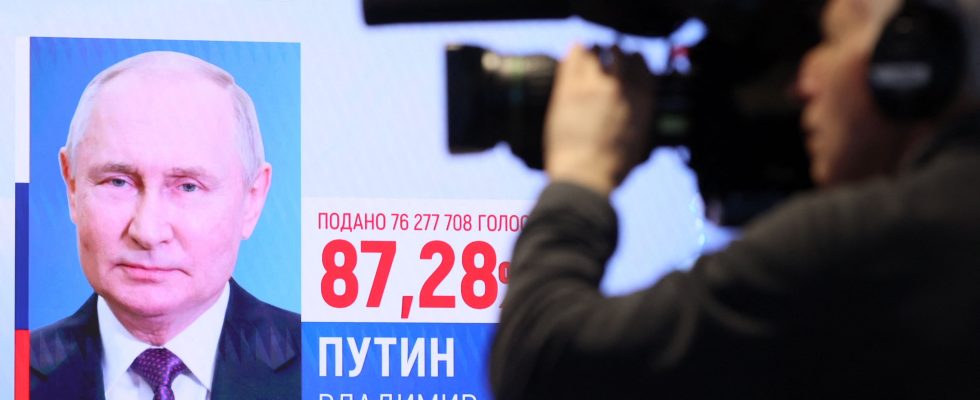If the re-election of Vladimir Putin was in no doubt, the result provoked numerous reactions. It must be said that a victory with 87% of the votes in the first round does not leave anyone indifferent. For some, it is a demonstration of force, proof of the unfailing support of a people fully committed to the cause of the master of the Kremlin. This is essentially what the spokesperson for the Russian embassy in France said recently, widely relayed by unofficial emissaries of Russian propaganda on social networks. For others, such a score can only make you smile or sadden, because it is simply too big to be honest. According to them, to gain such great support, one must necessarily have cheated. Hence the crystallization of the debate around the question of electoral fraud.
This is a rhetorical trap set by Russia because, whatever his detractors say, Vladimir Putin and his henchmen will always be able to argue about respect for the rules and the legitimacy of the vote. But ultimately, it is above all an error of analysis. Whether or not the rules were violated does not change the fact that such a score is necessarily bad news for democracy and an admission of weakness for the elected official.
Blurring the capabilities of citizens
To understand this, we have to go back to what we call “the dictator’s dilemma.” When a dictator organizes his re-election, he knows in advance that the results will not provide him with any information about the people. He would like to know what the population thinks, how many citizens hate him and who he can really count on; so much knowledge necessary to organize one’s power and undermine revolt movements. But he doesn’t have the means. Because they live in a dictatorship, citizens will not reveal their opinions, neither in polls nor during elections, so the dictator advances in the fog.
Aware of this situation, the experienced dictator knows that, even if he wins fairly, and whatever the votes, it will be impossible for him to know if the people really support him or if he claims to do so because the system requires it. Only one option remains: win with a score so high that it will create doubt among citizens as to its true popularity. Faced with the magnitude of the result, those who hate the dictator will always wonder to what extent their feelings are shared by their peers. In other words, and contrary to general intuition, the high scores in dictatorships do not serve to establish any power, nor to impose it on the leaders of other countries – all this is a veneer, an excuse a posteriori – but constitute the ultimate and only means of further blurring the ability of citizens to understand each other.
Parody of democracy
This is why every overwhelming victory is a defeat. At present, no one really knows who among Russians really supports Putin, and Putin himself does not know. Therefore, the real question, the only one that matters, is not whether the elections were tainted by irregularities, but to understand why they were organized. Since they reveal nothing, neither the support of the Russians, nor the power of the Kremlin, and we are told that Vladimir Putin is powerful and adored by his people, what is the use of a democratic election? After all, a dictator confident in his strength would not need to bother with these democratic processes. And a leader acclaimed by an entire people would impose himself. So this presidential election, what for? This question is all the more legitimate since this is a method of appointing leaders developed by companies that the Kremlin describes as “degenerate”.
The answer is obvious. No matter the yoke he exercises over his people, he cannot conceive of other ways to legitimize his power. And for good reason, there is none. So here he is forced to parody a system that he hates as much as he admires; without fully respecting its spirit, otherwise the risk of losing would be too great. Because in a true democracy, a liberal democracy, citizens really express themselves. They arbitrate based on ideals that are too complex to fit perfectly into a program and end up voting for the candidate they judge to be the least worst. Because they are free and their voice reveals their opinion, they hesitate, procrastinate, change their minds at the last moment, in a voting booth free of any state agent. Reasons why the results are always close, and the difference between losing and winning is tiny.
Unhappy candidates and disappointed voters often deplore this state of affairs, arguing that the winner is not sufficiently legitimate, since he only won by a few thousand votes. They are wrong. Narrowly elected, the president knows that he is on a tightrope, that he cannot ignore those who did not choose him, that he will still have to negotiate, seek consensus. In a free society, winning elections is only the beginning of the democratic process. In other words, when the people really vote, it is the narrowness of the victory which confers all its legitimacy to power.
This is why a president elected with 50% of the vote plus one is so valuable, and why a man with 87% of the vote is afraid.
* Pierre Bentata is a lecturer in economics at the Faculty of Law and Political Science of Aix-Marseille
.
